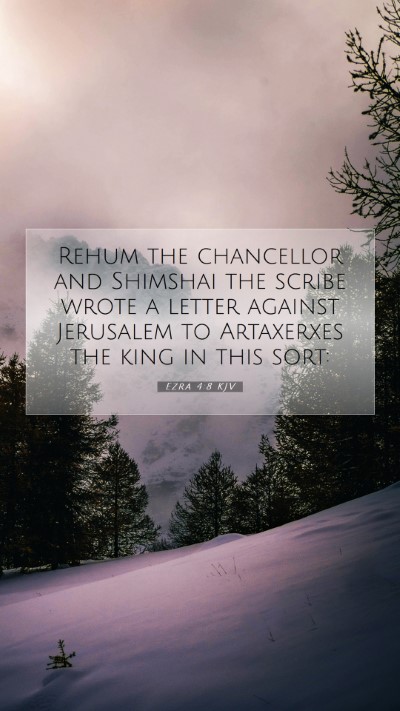Old Testament
Genesis Exodus Leviticus Numbers Deuteronomy Joshua Judges Ruth 1 Samuel 2 Samuel 1 Kings 2 Kings 1 Chronicles 2 Chronicles Ezra Nehemiah Esther Job Psalms Proverbs Ecclesiastes Song of Solomon Isaiah Jeremiah Lamentations Ezekiel Daniel Hosea Joel Amos Obadiah Jonah Micah Nahum Habakkuk Zephaniah Haggai Zechariah MalachiEzra 4:8 Meaning
What is the meaning of Ezra 4:8?
Rehum the chancellor and Shimshai the scribe wrote a letter against Jerusalem to Artaxerxes the king in this sort:
Ezra 4:8 Bible Verse Meaning
Understanding Ezra 4:8
In Ezra 4:8, we encounter a significant moment in the narrative of the Jewish return to Jerusalem following their exile. This verse is part of a letter from Rehum the chancellor and Shimshai the secretary to King Artaxerxes, expressing opposition to the rebuilding efforts of the Jews. This involvement of Persian officials highlights the broader political dynamics at play during this period of Israel's history.
Meaning of Ezra 4:8
The verse states:
“Rehum the chancellor, and Shimshai the scribe, wrote a letter against Jerusalem to Artaxerxes the king.” (Ezra 4:8, KJV)
Contextual Analysis
Understanding the meaning of this verse requires examining its historical context. After the Babylonian captivity, the Jewish people under the leadership of Zerubbabel began to rebuild the temple in Jerusalem. This restoration was met with hostility from surrounding peoples, which forms the backdrop of this correspondence.
Insights from Public Domain Commentaries
-
Matthew Henry's Commentary
Henry emphasizes the opposition faced by the Israelites as they sought to restore their homeland. He notes that the letter signifies the malice of their enemies, who were eager to report their actions in a way that would incite royal intervention against them. This illustrates a common theme in Scripture where God’s people encounter resistance when fulfilling divine mandates.
-
Albert Barnes' Notes
Barnes points out the significance of the titles used for the authors of the letter, highlighting their authority within the Persian administration. His commentary suggests that their action is a calculated move to undermine the Jewish efforts by creating a negative perception in the eyes of the king. This reflects on how political maneuvering can influence spiritual missions and highlights the need for steadfastness in faith amidst such challenges.
-
Adam Clarke's Commentary
Clarke expands on the motivations behind this correspondence, noting the historians' perspective in detailing these events. He argues that this letter serves as evidence of the animosity toward the Jewish people and that it represents the larger struggle of God’s people against external forces. Clarke invites the reader to consider how such historical reports lend weight to the themes of perseverance and divine protection found throughout the Old Testament.
Application of Ezra 4:8
Through the lens of Ezra 4:8, readers are encouraged to reflect on the relevance of the past to contemporary issues of faith and opposition. The challenges faced by the Jews serve as an analogy for modern believers who may experience resistance when pursuing their faith-related objectives. This verse speaks to the importance of understanding the strategies of those who oppose the faith and encourages perseverance and reliance on divine support.
Cross References
- Nehemiah 2:10: The opposition faced by Nehemiah in rebuilding the walls of Jerusalem is mirrored in the challenges presented here.
- Ezra 5:3-4: The continuing struggle against opposition during the rebuilding process demonstrates a recurring theme of resilience in adversity.
- Daniel 6: Daniel’s experience of being opposed due to his faith can resonate with the situation in Ezra.
- Zachariah 1:17: This verse emphasizes the promise of restoration for Jerusalem amidst opposition, offering hope amid struggle.
Conclusion
Ezra 4:8 is a critical reminder of the complex interplay between faith and opposition. It challenges believers to find strength and resolve in the face of adversity while remaining informed about the broader spiritual and political landscape. The verse invites deeper study into the struggles of God's people and the historical context that shapes the overall narrative of Scripture.
For Further Study: Those seeking deeper biblical insights are encouraged to utilize various Bible study tools and Bible study resources to enrich their understanding of Scripture and to cultivate resilience in their spiritual journeys.


